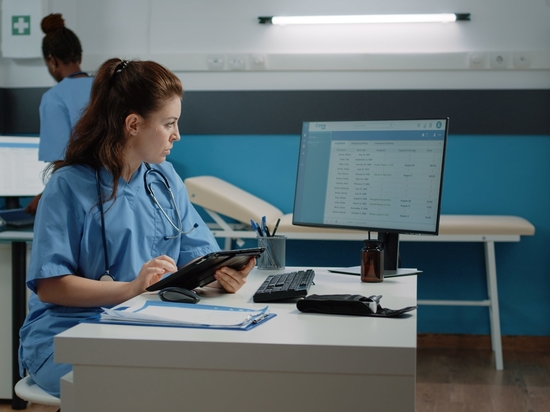
#Industry News
How to Choose the Right Enterprise Computer Solutions for Healthcare
Why you want medical computers in your nursing home
Medical computers are specifically built to handle the sometimes punishing environments in the healthcare sector, such as hospitals. Related health organizations, such as rehabilitation centers, nursing homes, and hospice care, may not always feel the need or have the financial means to install medical panel PCs in their facilities.
Today's article discusses enterprise computers as an alternative for these health organizations, collectively called skilled nursing facilities. It explains how enterprise PCs differ from medical-grade computers, why skilled nursing facilities like Athena Healthcare use them, and what features are essential to computer purchasers in such facilities.
Medical-Grade vs. Enterprise Computers
Medical-grade means the computer or device has been built, tested, and certified to work safely around patients (60601-1) and not interfere with other medical devices, such as EKG machines (60601-1-2). Many medical computers found in hospitals and healthcare establishments are medical-grade.
Enterprise computers, also known as enterprise-class and enterprise-grade computers, are not built to such standards and are thus less expensive. On the other hand, they are not off-the-shelf consumer models. Instead, enterprise PCs have been designed explicitly for the business setting, and many come with more memory and extensive network capability than consumer brands.
Reliability and Enterprise Computers in Healthcare
Reliability is critical in healthcare. Providers and their medical staff in an ER need to know and trust that their medical devices and equipment will function when used. A computer that only sporadically displays patients' electronic medical records can threaten lives, as providers make life-and-death decisions based on the records' information or lack thereof.
Most skilled nursing facility workers do not face the same pressures. Instead, their use of computers usually takes them away from patients, and medical devices that may be affected by those same computers are few and far between.
Still, they need for their PCs to work when needed. Facility workers are dedicated to delivering the highest quality of health care to their patients, whether those individuals are in the process of rehabilitation following an accident or finding solace in a hospice home. A malfunctioning computer system can significantly disrupt this essential care, leading to delays in treatment and creating additional stress for staff and patients. Furthermore, the financial burden associated with repairing or replacing these unreliable computers can strain already tight budgets, a common challenge faced by many skilled nursing facilities striving to maintain quality care under resource constraints.
Reliable Enterprise Computers: What to Look For
Enterprise computers are built to provide high reliability and are designed from the ground up to handle intensive business operations, such as 24/7 operation in server rooms or graphic processing.
The following features make enterprise computers more reliable for skilled nursing facilities.
Fanless Design: Fanned computers can break and entirely shut down the computer until repaired or replaced. Enterprise computers do not suffer such issues. Their fanless cooling systems make cleaning a breeze, as the staff doesn't have to worry about cleaning products entering the machines and damaging their interior. Fanless computers are also virtually noiseless, making them ideal for nursing home residents who need sleep.
IP65: Sealed front bezels protect the interior of the enterprise computer from dust and fluids from splashes and during regular cleaning in skilled nursing facilities. Again, this protection increases the PC's reliability.
Solid-State Drives (SSD): Like fans, hard disc drivers (HDDs) in most consumer computers have moving parts that can break down and render the devices unusable until fixed. HDDs can also lose vital information. SSDs in enterprise computers do not store data in this manner, which makes them more reliable, especially during extended use.
Rugged Design: Skilled nursing facilities can be bustling places like hospitals. At these times, computers get bumped, banged, jostled, and dropped and potentially suffer damage. Enterprise computers like Windows business tablets have been built to handle the abuse. Antimicrobial* casings protect the computer casing from deterioration and degradation.
VESA Mount: Skilled nursing facilities come in various layouts, from a physical therapist's rehabilitation gym to a private bedroom for hospice patients. The standard VESA mounts on enterprise computers make placing them convenient and reliable for staff and patients.
Cybernet Brings Reliability to Healthcare Enterprise Computers
Enterprise computers can be an alternative to medical computers for health organizations like skilled nursing. They are built with many features that make them reliable for use in such places.
Learn what makes enterprise PCs so reliable. Contact a Cybernet representative on our network of Enterprise computers for healthcare use. They happily cover the reliability of our Enterpire All-In-Ones and tablets, which have a failure rate of less than 0.5 percent.








